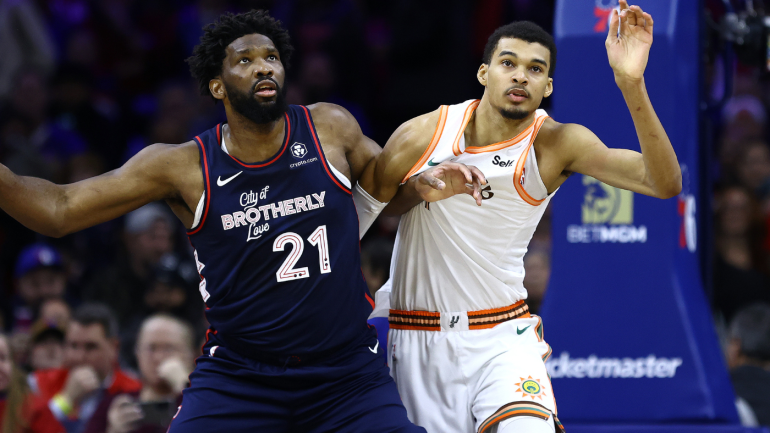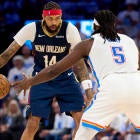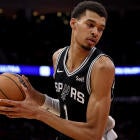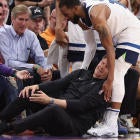
In an apparent effort to get its best players to play more games, the NBA instituted a new games-played minimum for most of its major awards. Now, any player hoping to win MVP, Defensive Player of the Year, Most Improved Player or make an All-NBA team needs to reach 65 games in order to attain award-eligibility. In truth, the change had little practical effect beyond All-NBA voting. Only one MVP, Bill Walton in 1978, has ever played fewer than 65 games in an 82-game season. Defensive Player of the Year has been slightly more permissive with four sub-65-game winners, but generally speaking, voters have been good at drawing their own lines and using common sense to determine when a player has missed too much time to win an award.
But what if we went the other way? What if we eliminated not only the 65-game minimum, but those common-sense determinations about playing time? What if we imagined a world in which players were judged only by what they did in the minutes they were on the court and every other minute their team played was stricken from the record?
That is what we are going to do today. Let's pretend that players could be judged based exclusively on their own minutes. In this exercise, there is no difference whatsoever between playing eight games or 80. A 10-minute player will be judged on the same scale as a 40-minute player. Who would our awards winners be if we judged them on a per-minute basis only? Let's find out.
MVP: Joel Embiid
Joel Embiid has played 1,157 minutes this season and scored 1,201 points. The second number is bigger than the first number. The second number should never be bigger than the first number. For his career, LeBron James has scored around .71 points per minute. Michael Jordan is a bit higher at 0.79, Embiid, this season, is at 1.038. Wilt Chamberlain averaged a shade below that in the 1961-62 season ... when he averaged 50 points per game. Before he suffered a tear to his meniscus, Embiid, who returned to action Tuesday night, was having quite possibly the greatest scoring season in NBA history. That alone is usually enough to win MVP, and it represents only a fraction of Embiid's case.
He is averaging a career-high six assists per game. Nikola Jokic may make that number look pedestrian, but it isn't. He and Domantas Sabonis are the only other full-time centers ever to do that for a full season. Embiid was in the midst of having arguably the best defensive season of his career as well before he went down. As of this writing, he ranks sixth in the NBA with a D-EPM of +3.3, and Philadelphia has allowed only 110.5 points per 100 possessions in his minutes. That figure would rank Philadelphia third in the league over the full season, and he did all of this under fairly trying circumstances. James Harden was on his roster on opening night. He's playing for a new coach in Nick Nurse on a roster that was at least partially built to be torn down this offseason in favor max cap space. That roster has gone 27-8 with him this season and 14-27 without him.
Embiid's per-minute MVP case is virtually unassailable. Perhaps you could take issue with the light schedule the 76ers played in December and January has he posted his historic numbers, but we're talking about what will ultimately be a 40-game sample or so. Those games didn't all come against the Wizards and Pistons even if a decent chunk of them did.
Embiid's injury was a shame for several reasons, but one of the bigger ones relates to all of the criticism he received for winning the award last season and following it up with yet another playoff disappointment. The voters may have gotten it wrong last season. They weren't going to this season. Embiid was the runaway deserving choice, playoff reputation be damned, and another trophy might've helped legitimize his otherwise stellar 2022-23 season. Whether or not he ever breaks through in the playoffs, Embiid is one of the great regular-season players of our time. He already has one trophy to prove that. Had he stayed healthy, it would have been two.
Defensive Player of the Year: Jonathan Isaac
I think about this screen shot a lot.
Jonathan Isaac blocked this dunk attempt.
— Sam Quinn (@SamQuinnCBS) February 3, 2024
Look at where he is. Look at where KAT is. Look at where the ball is. Just a breathtaking piece of defense by the best per-minute defender in the NBA. pic.twitter.com/YdjjCB6vrH
Jonathan Isaac is still in a crouch when this screenshot was taken. Karl-Anthony Towns, a four-time All-Star, former No. 1 overall pick and one of the most athletic big men in the NBA, was on his tip toes with fully extended arms maybe a foot or so short of a wide-open dunk. And Isaac blocked him. Now watch the whole play.
The speed of his elevation is mesmerizing, but it's that lightning-quick hand that stands out. Isaac routinely does things that look flat-out impossible. You think this block on Towns is incredible? Watch him shut down LeBron James and Anthony Davis on the same play.
We'd be here all day if I just started posting every single unbelievable Isaac clip. Were he exclusively a perimeter defender, he'd be among the best perimeter defenders in the NBA. He is already arguably the league's very best rim-protector, blocking more shots per minute than anyone except Victor Wembanyama, Walker Kessler and Daniel Gafford. He is the NBA's leader in D-EPM and ranks fourth in D-LeBron despite playing nowhere near as often as those he trails.
Orlando's defense allows 111.8 points per 100 possessions when Isaac is on the bench. That, already, would rank seventh in the NBA over the full season, yet their defensive rating still gets over 10 points better when Isaac enters the game. For reference, Orlando's 101.5 defensive rating with Isaac is 6.7 points lower than No. 1-ranked Minnesota's for the entire season. The Isaac-on Magic are the best defense the NBA has seen since the 2015-16 Spurs.
Isaac's lengthy injury history has limited him to around 15 minutes per game this season. He might be on a minutes restriction for the rest of his career. But he is far and away the best defender in the NBA when he actually is on the floor.
Most Improved Player: Jalen Johnson
Two philosophical notes on the nature of this award:
- This award, more than any of the others, suffers due to the 65-game rule. It makes sense to some extent with awards like MVP and its derivatives. Availability is a measure of value. It's hard to call someone, for instance, the most valuable defender in the league if their competition played in 20 more games. But this award measures improvement, which follows much more of a "Point A to Point B" track of logic. If we're trying to determine which player improved the most between April of the previous season and April of the current one, why would a 20-game absence in November and December matter?
- Even before the 65-game rule was instituted, this award was broken. It has largely devolved into the first-time All-Star award. The past seven winners have all been first-time All-Stars ... but they were also all picked in the top half of the first round and in their early-to-mid 20's. Did they improve? Or did they just hit a specific, anticipated point of their projected career trajectory? Tyrese Maxey this season is a perfect example. He is the favorite to win MIP, but he was already pretty clearly on an All-Star trajectory. The absence of James Harden gave him five extra shots per game this season, which he has used to score roughly five more points each night. But he's less efficient than he was a year ago. There are smaller, more granular ways in which he improved, but that's to be expected out of a fourth-year point guard operating as a primary ball-handler for the first time. The trajectory of his career didn't really change all that much.
But Jalen Johnson? The trajectory of his career is entirely different. His scoring output has nearly tripled since last season. He went from a 28% 3-point shooter in his first two seasons to league-average this year. He is now arguably the best defender the Hawks have after struggling to even get on the court a year ago. Johnson might have made himself $100 million with his performance this season. Most sportsbooks have only four players available for Most Improved Player right now. In terms of counting stats, Johnson's improvement beats them all.
| PPG change | APG change | RPG change | TS% change | eFG% change | |
|---|---|---|---|---|---|
Jalen Johnson | +10.4 | +2.3 | +4.5 | +3% | +2.4% |
Tyrese Maxey | +5.3 | +2.7 | +0.8 | -4.6% | -4.8% |
+9.6 | +2.4 | +1.8 | 0 | -1.7% | |
+5.6 | +1.3 | -0.5 | +2.2% | +2.6% | |
+6.4 | +0.2 | +1.4 | 0 | -2% |
There's an argument to be made here that the jump players like Maxey and Williams have made from good starters to stars is the more significant leap, but that's not the name of the award. It's not "player who improved in the most significant way," it's "MOST Improved Player." Jalen Johnson improved the most. He did the most to change the trajectory of his career. Did he have a slightly easier time doing so because he was starting from a lower point? Of course he did, but that's precisely what this award is meant to capture. We want to give it to players who came out of nowhere. That is Johnson.
Sixth Man of the Year: Klay Thompson
I seriously considered giving this award to Isaac as well. It's hard to top the value of bringing the best defensive player in basketball off of the bench. But individual offense means more than individual defense, and there are two per-minute megastars offensively that get the slight nod here.
The first candidate, and the winner I expected when I conceived this story, is Isaiah Joe. He is this season's bench per-minute plus-minus king. In 1,315 minutes, the Thunder have won Joe's minutes by 314 points. That isn't technically the bench leader, as Payton Pritchard is at +354, but it's worth noting here that Boston isn't exactly a fair measure here because seven of the top 21 players in league-wide plus-minus are Celtics. The Thunder have several players in the top 31 as well, but most of them are clustered in Joe's region despite playing far more minutes.
Joe's value comes largely from his shooting. In 71 bench appearances, he's shooting 41.8% from 3-point range on nine attempts per 36 minutes. A month or so ago, that would have been enough to win him this award. Here's the problem: an even better bench shooter has emerged since then.
In 14 bench appearances, Klay Thompson is taking an absolutely preposterous 13 3-pointers per 36 minutes. He's making more of them too at 42.8%, and he's a more versatile overall scorer that is putting up 26 points per 36 minutes as a reserve compared to 16 for Joe. Thompson's plus-minus numbers aren't as jarring as Joe's, but the Warriors are +24 in around 383 bench minutes for Thompson. Considering the lower quality of team he's playing for and the fact that Golden State is trending in the right direction, that figure is fine.
Purely offensively, bench Klay Thompson is more or less playing like peak Klay Thompson. Assume they're playing the same number of minutes. Would you rather have a peak-Thompson-level bench scorer, or a Defensive Player of the Year-caliber reserve? The answer is probably the second-best shooter in NBA history. Thompson may cool off in the final week-and-a-half of play. If he does? Thompson and Joe will have arguments. But Thompson's 14 bench games have been stellar even if the rest of his season hasn't been.
Rookie of the Year: Victor Wembanyama
... Shocker, right? The greatest prospect in NBA history, who is well on his way to winning the actual Rookie of the Year award, is our per-minute winner. We don't need to waste any time justifying this selection, but there is an interesting conversation to be had about where Wembanyama ranks among all per-minute rookies in NBA history.
- Wembanyama is averaging 26.1 points per 36 minutes. That would rank fifth among Rookie of the Year winners, trailing Wilt Chamberlain, Walter Davis, Walt Bellamy and Michael Jordan.
- Wembanyama is averaging 4.6 assists per 36 minutes. That would tie him with Geoff Petrie for 25th among Rookie of the Year winners, but the only true big man ahead of him on that list would be Alvan Adams with 6.1.
- Wembanyama is averaging 13 rebounds per 36 minutes. That would place him 11th among Rookie of the Year winners ... but second among post-merger winners behind Shaquille O'Neal. Everyone else ahead of him entered the league in 1970 or, in most cases, far earlier.
- Wembanyama is the all-time leader among Rookie of the Year winners with 4.6 blocks per 36 minutes.
- Wembanyama is averaging 1.6 steals per 36 minutes, which would put him in a tie for 14th.
A total of 80 Rookies of the Year have been named. Wembanyama ranks in the top 25 in all five major categories, leads one by a mile, ranks sixth in another and finishes second in a third if we only consider post-merger numbers. Obviously, Wembanyama did not join a team capable of giving him the immediate team success that players like Magic Johnson or Tim Duncan had. As a purely individual rookie, though, Wembanyama's season is probably up there with just about anyone's. Frankly, if he was playing 36 minutes per night instead of 29, he'd already have a pretty reasonable case for Defensive Player of the Year and All-NBA if he doesn't already.






















